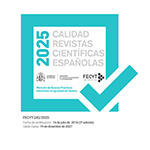La distribución del tiempo productivo y reproductivo en las parejas reconstituidas. ¿Son más equitativas que las biparentales?
Resumen
Se analiza la distribución del tiempo de las parejas reconstituidas a partir de las Encuestas de Empleo del Tiempo 2002-2003 y 2009-2010, comparando las parejas reconstituidas con algún hijo menor de 18 años con las parejas biparentales de características similares. Se evalúa el tiempo total (hombre más mujer) y la diferencia de tiempo (hombre menos mujer) que las parejas invierten en trabajo remunerado y no remunerado, distinguiendo las tareas domésticas de las de cuidado. El primer hallazgo es que, en su conjunto, las parejas reconstituidas invierten menos tiempo en trabajo no remunerado que las biparentales –sobre todo en trabajo doméstico–, presumiblemente por su experiencia previa de monoparentalidad. En cuanto a las diferencias de género, la conclusión apunta que las parejas reconstituidas en las que ella aporta los hijos son claramente más igualitarias que las biparentales, mientras que cuando es él quien aporta los hijos, la conclusión es menos evidente.Descargas
##plugins.generic.pfl.publicationFactsTitle##
##plugins.generic.pfl.reviewerProfiles## N/D
##plugins.generic.pfl.authorStatements##
Indexado: {$indexList}
-
##plugins.generic.pfl.indexedList##
- ##plugins.generic.pfl.academicSociety##
- N/D
- Editora:
- Ediciones Complutense
Descarga artículo
Licencia
La revista Cuadernos de Relaciones Laborales, para fomentar el intercambio global del conocimiento, facilita el acceso sin restricciones a sus contenidos desde el momento de su publicación en la presente edición electrónica, y por eso es una revista de acceso abierto. Los originales publicados en esta revista son propiedad de la Universidad Complutense de Madrid y es obligatorio citar su procedencia en cualquier reproducción total o parcial. Todos los contenidos se distribuyen bajo una licencia de uso y distribución Creative Commons Reconocimiento 4.0 (CC BY 4.0). Esta circunstancia ha de hacerse constar expresamente de esta forma cuando sea necesario. Puede consultar la versión informativa y el texto legal de la licencia.











